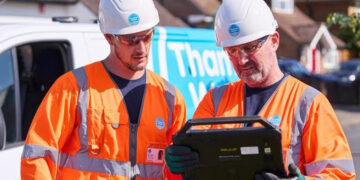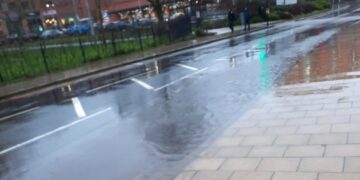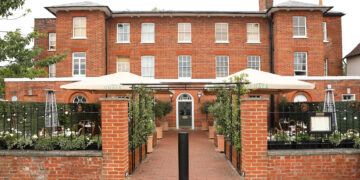WOKINGHAM is to receive new recycling sacks aimed at reducing the amount of wet cardboard sent to landfills.
A special meeting of the executive committee – Wokingham Borough Council’s ruling body – was convened on Friday, September 11, to discuss the business case so that the bags could be ordered as quickly as possible, and the vote was in favour.
Before the decision was made, there were a number of questions from both the public and councillors.
Chris Johnson wanted to find out more about the lifespan of the recycling sacks. He pointed out that the agenda said that this was between three and five years, not five-and-a-half years as previously stated or 13.3 years as indicated by the financial weighting in the options appraisal.
He said: “As this solution is supposed to last until 2026, there is clearly going to be an increased need to replace these sacks during this time. Why has this not been fully realised in the modelling?”
Responding, Cllr Parry Batth, the executive member for environment and leisure, said that he was unsure where the 13-and-a-half year figure came from.
He added: “I can confirm that the life expectancy of the bags is five years as per the manufacturers’ experience. However, they can last beyond five years and this certainly reflects the Council’s experience with the garden waste bags pre-2012, in that it was found they lasted well over five years. It is therefore expected that this solution will last beyond 2026 if required.”
Mr Johnson said that he believed that the lifespan was an assumption and that the plastic boxes were sturdier.
Beth Rowland was the next person, who wanted to know how the council had consulted with representatives from protected characteristic groups for completion of the Equality Impact Assessment on the proposed ‘hessian’ recycling bags and what their input was.
Cllr Batth said that the assessment had been undertaken and the proposed new system “ is not a substantial alteration to the existing service”.
He added that testing has shown that the empty bags weigh less than the current boxes so will be easier to handle.
“I am therefore confident that these new containers are convenient, practicable and in some ways easier to use for those who are elderly or have a disability,” he said.
Ms Rowland responded by saying that she would find problems opening velcro, and wanted to know what provisions were being made by similarly affected residents.
Cllr Batth pledged to discuss a solution ‘offline’ and away from the meeting, a suggestion welcomed by Ms Rowland.
Council leader Cllr John Halsall also promised that the council would do what it could to help people.
Ian Shenton wanted to know if the sacks would provide value for money if the procurement for them was handled by Veolia and not the council.
“The contract works on a number of key criteria including transparency and partnership working,” Cllr Batth responded. “Wokingham Borough Council would see all prices which are paid and ensure we are getting best value on all containers that we purchase through the contract.”
This included having “significant” procurement influence that would help the council.
“An additional advantage of utilising Veolia is that the management of risk lies with them so in the unlikely event of an issue it will be Veolia to be liable for and resolve rather than the Council,” Cllr Batth added.
Cllr Halsall said his officers “had a good idea what the market price is”.
Responding, Mr Shenton said that the ultimate disposal of the sacks concerned him – “it is not an easy process” he said, asking for details on this.
Cllr Batth said that they had requested recyclable sacks and that they had been assured this was the case.
Mike Smith wanted details on the costs, based on his own
“They don’t seal very well or keep the water out,” he said, adding that the shower caps and box lids had “no difference has all three do exactly the same job in keeping the rain out”.
“The rest of the model is equally open to criticism.”
He added: “Please can you explain how you justify to the residents of Wokingham, not doing any practical trials with the residents before spending over a quarter of a Million pounds in capital with additional annual costs of £235,000 as the business case is not, to my mind, as a retired technical auditor, comprehensive, robust and compelling.”
Cllr Batth said: “The collection arrangements in Cornwall are very different to our own and they have three different receptacles to separate recycling material as compared to our single receptacle.
“We aim to make recycling as easy as possible for our residents and this is likely the reason why our current recycling rate is double that of Cornwall.”
He added that the bags were assessed against other options “
And Mr Smith said in response, “which has been informed by other Council’s findings and the consultant’s considerable expert knowledge and experience.
“Officers have also fully tested the proposed bags to ensure that they are waterproof.”
He also told Mr Smith that the bags were “the best short-term solution to wet waste to both save the Council money and to increase recycling”.
Responding Mr Smith wanted to know if the bags didn’t produce the savings or didn’t work.
Cllr Batth said that the council was confident that it would.
Cllr Halsall said residents seemed to be happy with blue bags and food waste collection, but the market for recycling has changed “and got more picky”, the rejection of the wet recycling was a cost of £600,000 a year.
The lids seem an obvious solution but the collection crews said it would be a nightmare, Cllr Halsall continued.
“We recognise it’s a compromise, we’ve taken the best advice,” he said. “We have to in current straightened circumstances have to do something about £600,000 down the drain. Covid has hit our balance sheet very hard and we’re in a recovery situation, and we just have to do something.”
Cllr Gary Cowan was due to the best the first councillor to ask a question but did not attend a meeting.
Cllr Sarah Kerr said that Liberal Democrats supported the need to do something: “It has been highlighted that there are serious flaws in the options appraisal that could materially change the outcome of the report. Why is this same options appraisal still being used when it’s clearly flawed?”
Cllr Parry Batth hit back, saying, “Your question is not specific, nor cites an example. However, based on your question at Overview and Scrutiny on 26 August I am deducing that this is around the ‘write-off’/lifespan of the respective containers.”
Cllr Kerr said that it was one of the areas.
“Given that the scrutiny committee supported the recommendations of the report, I am unclear how you can make this assertion,” Cllr Batth continued.
“I can confirm that the life expectancy of the bags is five years as per the manufacturers testing and delivery experience. They anticipate a lifespan more than this but have identified a prudent timeframe.”
He added that it was expected that the bags would last beyond 2026.
Cllr Kerr also queried the capacity of the sacks and asked why the council had taken so long to act over wet waste.
She said that the trial didn’t happen in two wards, and said it would have been responsible to have carried out such a trial.
Cllr Batth said that the council’s very experienced officers helped with the decision-making process, with the sacks considered to be “very effective”.
Cllr Clive Jones, the Lib Dem’s deputy leader, who wanted to know what evidence there was that only one additional vehicle and crew was needed for the sacks.
“There is no supporting evidence in the options report,” he said
Cllr Batth said: “In parallel with the work undertaken by the consultants, officers conducted further research with the collection contractor Veolia.
“These discussions highlighted that it would take approximately three seconds extra for the bags to be emptied. As is, the boxes take on average six seconds per property to empty and return. It was modelled that the bags would take nine seconds which would mean an additional 40 hours of work per week to cover which equates to an additional vehicle and crew.”
He added that the shower caps and lids would need another additional vehicle and that the annual cost of a crew and maintenance would be £235,000.
“If we did nothing, then the impact on budgets would equate to £600,000 per annum due to the wet waste issue,” he added.
Cllr Jones again pressed for evidence in the reports presented to the meeting.
“Would you agree that if the extra three seconds is wrong, and it was nearer to five or six seconds the cost to the council would be another £235,000.”
Cllr Batth said that trials were undertaken to show how long the bags.
Cllr Paul Fishwick wanted to know the impact on the other local authorities that use sacks.
Responding, Cllr Halsall said: “Due to the time constraints given on this question, the additional work required to fully inform the response could not be undertaken. Therefore, this work will be conducted and reported back once complete.”
But Cllr Fishwick hit back: “It was submitted quite some time ago – that was ridiculous. This was submitted on time on Monday.
Cllr Fishwick added: “I can tell you what the answer is – zero.”
One council only started their new scheme on August 3.
“This is absolutely disgraceful,” he said.
Cllr Prue Bray pointed out that Monmouth County Council have been asking its residents to separate recyclables into different bags.
“It is surprising that there does not appear to be any consideration of stopping co-mingling in the options considered in Wokingham. Why was this not looked at?”
“By utilising the bags, the paper material will remain dry and there will not be any contamination issues due to wet paper,” Cllr Batth said. “Therefore, there is no need to collect the respective materials separately.”
Cllr Caroline Smith wanted to know if there was evidence that the sacks would be used for additional recycling by residents.
“If nothing was done to mitigate the wet paper issue, then the loss of recycling would be 6% off the current recycling rate – 54% to 48%,” Cllr Batth said.
“It is evident from the blue bag compositional analysis of what is thrown away that good recyclate is being disposed of and every item needs to be captured in order to meet our climate change and recycling objectives.”
He pledged a comprehensive education campaign to residents when the sacks are introduced to boost recycling rates.
“We encourage all residents to recycle and each household will receive two bags and if required residents can opt for additional bags if needed,” he said.
Cllr Smith asked where the evidence for these figures came from.
Cllr Batth said that it was because it was a bigger bag.
Cllr Halsall asked Cllr Batth to introduce the motion to adopt the proposal to mitigate against wet paper which would see the bags introduced.
He said the bags had been tested for waterproofness, and that the executive would make a firm decision on adopting them.
Cllr Richard Dolinski said that the business case that the black boxes would be collected but he couldn’t see the cost of that. He wanted to know what it would be.
“There is a cost,” Cllr Batth said, adding that the plan was to turn them into benches. The cost would be around £28,000 to collect the boxes.
Cllr John Kaiser said that the budget situation was well known and that the council had spent a lot of money employing professional officers with the right expertise.
“This isn’t something we’ve made up as members, it’s gone through professional officers,” he said of the case of saving money by using the sacks. “We would be foolhardy to go against their advice”, he warned.
Cllr Wayne Smith said that the council had no control over the world recycling market, and that the council’s officers were some of the best in class, praising Peter Bavbeystock for doing a fantastic job handling the council’s waste and reculing and that they had come up with the best solution possible.
Cllr Halsall wanted to reiterate much of what Cllr Kaiser had said, adding that “we are not trying to make an investment, we’re trying to save money”.
The action over the sacks came as soon as they had received the consultant’s reports, and that they were trying to look after their residents’ money.
“Anyone can take the report and say why didn’t you do this… it’s pitiful point scoring, I regret we have come to come,” he said. “We do need to get on with it,” he said.
“We’ve got to rely on our professional expertise and our officers, we can’t just make it up as we go along … there is best practise, we really need to make that decision quickly. That is what we are doing.
“There is no perfect solution to these problems, it’s something we hadn’t foreseen two or three years ago, no one could have predicted China doing what they did. But we have to take the world as we find out.
“£600,000 pays for a lot of children’s services and adult services,” he said, adding that Covid had caused a drain on the council finances, and he feels that “we cannot afford to waste that money”.
He added: “This is an interim solution, we are looking at a long-term solution, we are ambitious and we do want the Lib Dems to be involved in that. It will probably lead to a radical change in what we do – zero waste to landfill is a really ambitious project, this is just a milestone in that project.”
The paper was taken to the executive in July for “transparency”, and he recommended that the executive approved the proposal.
Cllr Jones criticised this stance, but Cllr Halsall said that he had published the report as soon as they had received it and the call-in decision had stopped the process.
They now needed to go ahead “without further impediment”.
A virtual show of hands was taken of the executive, which carried the motion.
This means that Wokingham Borough Council residents will now have their black boxes replaced by the plastic sacks.













































